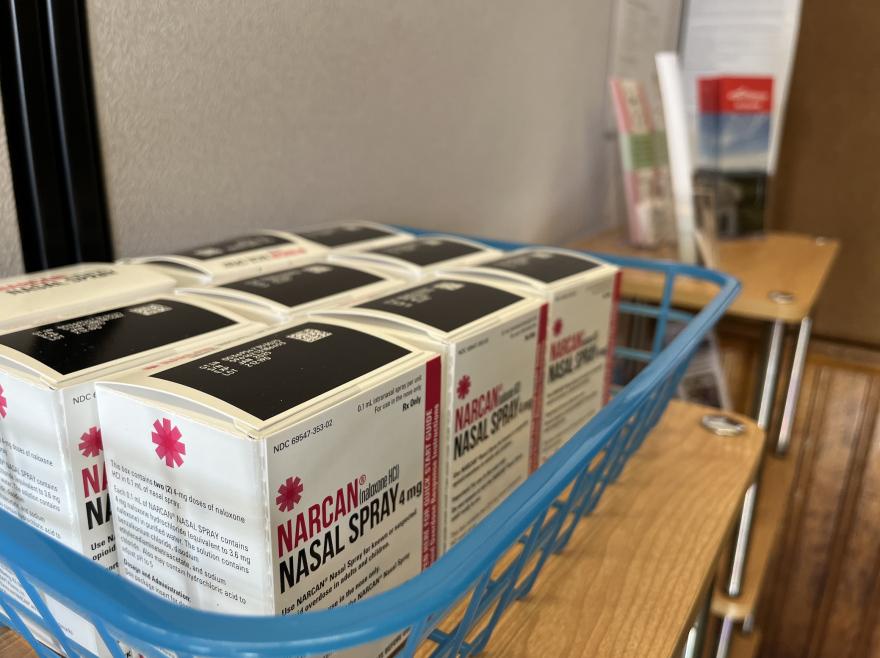State health officials are warning that the sudden closure of a network of addiction treatment clinics in New Hampshire and Vermont could put some patients at risk of relapse.
New England Medicine and Counseling Associates closed abruptly after its owner, Dr. Adnan S. Khan, was indicted on federal charges and his medical license was suspended.
New Hampshire health officials say they’re worried the closures could interrupt care for patients taking buprenorphine – a medication that blunts opioid cravings. They’re urging those patients to switch to new providers as soon as possible.
New Hampshire residents who need to connect with a new provider can call 211, go to one of the state’s Doorway locations or talk to their primary care doctor if they have one.
Suddenly losing access to a medication like buprenorphine “puts individuals at an increased risk of having withdrawal symptoms and potential opioid overdose,” said Dr. Jonathan Ballard, the chief medical officer at the New Hampshire Department of Health and Human Services.
Ballard said there are plenty of providers in New Hampshire who can prescribe buprenorphine, sometimes sold under the brand name Suboxone. The state says it’s partnered with the New Hampshire Medical Society to train more than 600 medical providers to prescribe it since the federal government eased restrictions on buprenorphine in 2023.
“There are opiate use disorder specialists, substance use disorder specialists, across the state who are accepting new patients,” Ballard said. “And it is our expectation that the system in large can absorb these patients. But they do need to take action quickly to establish care.”
Ballard said anyone who runs out of buprenorphine and goes into withdrawal, or relapses, should seek care at an emergency department. ER doctors can often prescribe buprenorphine as a “bridge” until someone can see a new provider, he said.
In a news release this week, the state health department alerted ERs that they may see an increase in patients experiencing withdrawal or seeking buprenorphine because of the clinic closures.
Ballard also warned against trying to buy buprenorphine illicitly, because it could be tainted with fentanyl and cause someone to overdose. The risk of an overdose is especially high after someone’s been on a medication like buprenorphine, because their tolerance will be lower.
He encouraged patients and their families to keep the overdose-reversal drug naloxone on hand. It’s available at pharmacies and is free at any of New Hampshire’s Doorway sites.
Federal prosecutors in Vermont last month charged Khan with unlawfully distributing controlled substances and health care fraud. They allege Khan would prescribe buprenorphine without a legitimate medical purpose, knowing it would be diverted or misused – often requiring patients to pay in cash, even if they had Medicare or Medicaid.
They also accuse Khan of falsifying records and seeking kickbacks from labs when ordering medically unnecessary urine tests that could be reimbursed by insurance.
Khan has pleaded not guilty. His attorney did not respond to a request for comment Thursday, and NHPR’s previous attempts to reach him were unsuccessful.
The New Hampshire Board of Medicine issued an emergency suspension of Khan’s license on May 21.
New England Medicine and Counseling Associates operated locations in Grantham, Newport, Manchester and Rochester, as well as in Rutland and Colchester, Vermont.
Andrew Warner, Manchester’s director of overdose prevention, said any interruption in treatment can be a vulnerable moment for someone in recovery. He urged those people not to give up, and to continue their treatment with a new provider.
Like Ballard, he said New Hampshire has no shortage of providers who can prescribe buprenorphine, including telehealth options.
“There's no reason for anyone to go without their medication in New Hampshire right now,” he said. “There's many, many places that you can get it.”
People seeking treatment for substance use disorder in New Hampshire can call 211, or go to one of the state’s Doorway locations.








